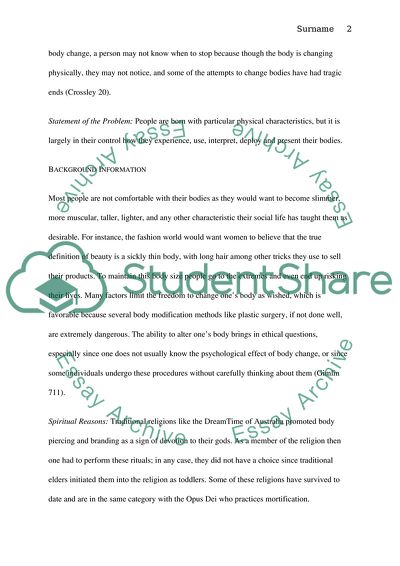Cite this document
(Sociology of the Body and Freewill Essay Example | Topics and Well Written Essays - 1250 words, n.d.)
Sociology of the Body and Freewill Essay Example | Topics and Well Written Essays - 1250 words. https://studentshare.org/sociology/1764674-1-we-are-born-with-particular-physical-characteristics-but-how-we-experience-use-interpret-deploy-and-present-our-bodies-is-to-a-great-extent-under-our-own-control-critically-discuss-this-statement-using-at-least-one-major-sociological-p
Sociology of the Body and Freewill Essay Example | Topics and Well Written Essays - 1250 words. https://studentshare.org/sociology/1764674-1-we-are-born-with-particular-physical-characteristics-but-how-we-experience-use-interpret-deploy-and-present-our-bodies-is-to-a-great-extent-under-our-own-control-critically-discuss-this-statement-using-at-least-one-major-sociological-p
(Sociology of the Body and Freewill Essay Example | Topics and Well Written Essays - 1250 Words)
Sociology of the Body and Freewill Essay Example | Topics and Well Written Essays - 1250 Words. https://studentshare.org/sociology/1764674-1-we-are-born-with-particular-physical-characteristics-but-how-we-experience-use-interpret-deploy-and-present-our-bodies-is-to-a-great-extent-under-our-own-control-critically-discuss-this-statement-using-at-least-one-major-sociological-p.
Sociology of the Body and Freewill Essay Example | Topics and Well Written Essays - 1250 Words. https://studentshare.org/sociology/1764674-1-we-are-born-with-particular-physical-characteristics-but-how-we-experience-use-interpret-deploy-and-present-our-bodies-is-to-a-great-extent-under-our-own-control-critically-discuss-this-statement-using-at-least-one-major-sociological-p.
“Sociology of the Body and Freewill Essay Example | Topics and Well Written Essays - 1250 Words”. https://studentshare.org/sociology/1764674-1-we-are-born-with-particular-physical-characteristics-but-how-we-experience-use-interpret-deploy-and-present-our-bodies-is-to-a-great-extent-under-our-own-control-critically-discuss-this-statement-using-at-least-one-major-sociological-p.


